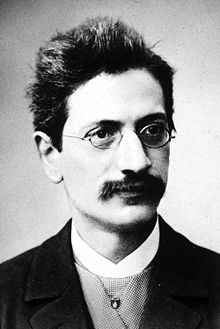Adolf Hurwitz
| Adolf Hurwitz | |
|---|---|
 |
|
| Born |
26 March 1859 Hildesheim, Kingdom of Hanover (now part of Germany) |
| Died | 18 November 1919 (aged 60) Zürich, Switzerland |
| Residence | Germany, Switzerland |
| Nationality | Germany |
| Fields | Mathematician |
| Institutions |
ETH Zürich Albertus Universität Königsberg |
| Alma mater | Universität Leipzig |
| Doctoral advisor | Felix Klein |
| Known for |
Riemann–Hurwitz formula Hurwitz quaternion |
Adolf Hurwitz (German: [ˈaːdɔlf ˈhʊʁvɪts]; 26 March 1859 – 18 November 1919) was a German mathematician who worked on algebra, analysis, geometry and number theory.
He was born in Hildesheim, former Kingdom of Hanover, to a Jewish family and died in Zürich, in Switzerland. His father Salomon Hurwitz, a merchant, was not particularly well off. Hurwitz's mother, Elise Wertheimer, died when he was only three years old. Family records indicate that he had siblings and cousins, but their names have yet to be confirmed. Hurwitz entered the Realgymnasium Andreanum in Hildesheim in 1868. He was taught mathematics there by Hermann Schubert. Schubert persuaded Hurwitz's father to allow him to go to university, and arranged for Hurwitz to study with Felix Klein at Munich. Salomon Hurwitz could not afford to send his son to university, but his friend, Mr Edwards, agreed to help out financially.
Hurwitz entered the University of Munich in 1877, aged 17. He spent one year there attending lectures by Klein, before spending the academic year 1877–1878 at the University of Berlin where he attended classes by Kummer, Weierstrass and Kronecker, after which he returned to Munich.
In October 1880, Felix Klein moved to the University of Leipzig. Hurwitz followed him there, and became a doctoral student under Klein's direction, finishing a dissertation on elliptic modular functions in 1881. Following two years at the University of Göttingen, in 1884 he was invited to become an Extraordinary Professor at the Albertus Universität in Königsberg; there he encountered the young David Hilbert and Hermann Minkowski, on whom he had a major influence. Following the departure of Frobenius, Hurwitz took a chair at the Eidgenössische Polytechnikum Zürich (today the ETH Zürich) in 1892 (having to turn down a position at Göttingen shortly after ), and remained there for the rest of his life.
...
Wikipedia
